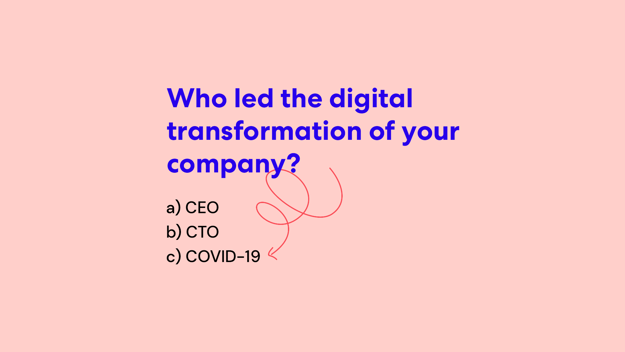There was a period in 2020 when the word "unprecedented" became so overused that it moved from communication to cliche to comedy in a matter of weeks. It is understandable though — everybody was scrambling for a plan, a way to make sense of things — and that included our rapporteurs.
Will subsequent years be different? Sort of...
Even with the roll out of the vaccines, the effects of Covid-19 will be felt for some time. But after months of coping with this virus precedents have been set for what does — and does not — work. Especially in the realm of digital transformation.
Back in the summer of 2020 this joke — or some version of it — was impossible to avoid on Twitter or LinkedIn. It was popular because there was a pretty large nugget of truth exposed in it. Covid-19 had opened doors previously padlocked, with digital tools widely embraced in organisations and industries that had been slow on the uptake previously.
That said, much of this "transformation" was limited in ambition. For many, it involved embracing remote working via Microsoft Teams and then scrambling to scale the capability of a VPN previously used to dealing with a handful of "work from home" outliers rather than an entire organisation.
For some though, 2020 was a time for rapid development of services and products — especially in public service.
The Institute for Government's 'Digital Government during the Coronavirus' report is a great summary of the work that was done across Central Government and parts of the NHS while colleagues at places like LOTI documented the challenges and solutions that Local Government faced.
Time and again the same lessons keep repeating — for good or ill — and these precedents need to be captured.
So here are three lessons I hope we build on in the years to come… and a couple I hope we learn from.
1) Prioritisation
"If you have more than three priorities, you don’t have any."
- Jim Collins
One thing that the Covid response proved is just how much can get done when there are focused priorities. Teams delivered high quality outcomes, at pace, all across public services. Organisations solved problems that were considered impossible mere weeks previously. For the most part it was the same people making these things happen as organisations had available to them pre-Covid-19, but suddenly people were successfully shipping solutions - and then improving them based on feedback and rapid development.
Prioritise. Commit. Persevere.
I really hope this is one of the lessons that sticks from this crisis. That the powers that be see just how much is possible with a clarity of purpose and empowered teams…and that in future it doesn’t take quite such a threat to provide this clarity.
2) Build or buy better
The build/buy conundrum has become a bit of a religious war over the years with some pretty dogmatic stances on both sides. Hopefully, something that will emerge from 2020 is a better understanding of the nuances in decision making and the realisation that the choice between building or buying new technology is a continuum — with trade offs at every waypoint.
Some valid questions to ask when faced with this debate:
- do we already have something that can do most of this?
- is someone else doing this already elsewhere?
- is there a decent SaaS product that can do this?
- is there an open source product we can use?
Ask the questions and make the best choice without preconceptions and with an awareness that "perfect is the enemy of good".
Sometimes you need to build something from scratch and often you need to re-configure something to make it work locally — but look sideways first and honestly "not invented here" does not mean "not useful here".
3) Trust
Throughout the pandemic response, one of the things that you could see regularly was that teams were being trusted to get things done. Outcomes and needs were being communicated and teams were given the opportunity to respond. Some of this was by necessity — everybody was so stretched it meant the usual governance juggernaut across public service was parked for a while. But the teams responded admirably, which ultimately justified the trust placed in them (as well as resulting in more being built).
As mentioned in the Institute for Government report, GDS reworked but did not abandon, its assessments. This new lighter weight approach - closer to what I always thought they should be like - provided leadership with assurance, teams with insights and avoided being a drag on the pace of delivery… and could not be mistaken for some kind of funding gateway!
A benefit of empowered teams justifying this trust is that you could see the risk appetite of some organisations increase. They started to see the opportunities and not just the challenges of digital and realised they had the people to make these moves. It is this awakening that will hopefully be the digital transformation legacy of Covid-19 rather than the rise of the "Republic of Microsoft Teams".
What we still need to learn
Having noted these three positives, now it's on to the must do better column:
1) Move fast but scale things
Here we first need to acknowledge the dangers of moving at pace and launching with MVPs, not in order to abandon the approach but to ensure that we follow through and don't leave teams and products hanging.
The problem is that whilst it is one thing to hack an appropriate solution together rapidly to meet an immediate need, what is created is unlikely to really stand up to scrutiny or scale over time. Often leadership will see that initial win as a problem solved and attention will move elsewhere. Yet in reality, this is the time to double down, shore up and even rebuild — implementing the learnings and preparing for the scale. Without this work that initial success has just swapped one risk for another.
Without pointing fingers, this kind of thing made the news more than once in 2020.
2) Announcement-Driven Development
Whether it was CEOs, founders or Ministers, time and again announcements about technology solutions (which like the IfG report says again are rarely a suitable replacement alone without solid service design) were made from lecterns that failed to manage expectations, set impossible deadlines and — I suspect — led to Product Managers discovering their priorities from the TV or Twitter at the same time as the rest of us.
While I suspect it will never go away, there is no doubt this behaviour was an element in some of the more high profile missteps in 2020. The Track and Trace app, for example, certainly didn't benefit from the cloud of spin surrounding it and the National Careers Service silliness smelt of a last minute announcement driven pivot.
We're working on it
As a final note, one of the things I'm disappointed to not be able to claim as a precedent from 2020 is "working in the open". There were some great examples — the creation by Essex Council of a directory of services to help children and families during the lockdown, or the tools built to help vulnerable residents in Camden, for instance — and where it happened it was powerful and useful.
Some individuals took this approach on themselves where official channels were lacking — this was a true public service but a burden that I believe should have been shared and better supported. Unfortunately, much of the higher profile work was tight-lipped and formal in its communications - and all the worse for it when issues emerged. The number of conspiracy theories that filled the space of open communication was notable in 2020.
So let renew our commitment to building on the useful precedents and not hide behind "unprecedented times" any longer. We at TPXimpact are ready to help you move things forward while learning from the recent past.

Place and infrastructure: thinking about digital transformation in a new way
Digital transformation is more than gadgets or sensors—it's about the intentional and adaptive design of policy, planning and project delivery to achieve user and economic outcomes.
Read moreOur recent insights

Place and infrastructure: thinking about digital transformation in a new way
Digital transformation is more than gadgets or sensors—it's about the intentional and adaptive design of policy, planning and project delivery to achieve user and economic outcomes.
Read more
How agile practices and user-first approaches are key to creating joined-up services.
Read more
How we can transform local authorities for long-term success
What councils can do now to help address financial challenges now and in the future.
Read more

